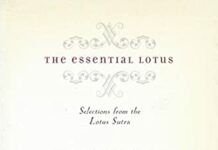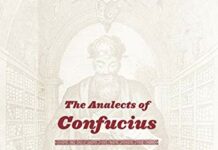
Ebook Info
- Published: 1993
- Number of pages: 390 pages
- Format: PDF
- File Size: 10.02 MB
- Authors: Burton Watson
Description
Since its appearance in China in the third century, The Lotus Sutra has been regarded as one of the most illustrious scriptures in the Mahayana Buddhist canon. The object of intense veneration among generations of Buddhists in China, Korea, Japan, and other parts of the world, it has had a profound impact on the great works of Japanese and Chinese literature, attracting more commentary than any other Buddhist scripture.As Watson notes in the introduction to his remarkable translation, ” The Lotus Sutra is not so much an integral work as a collection of religious texts, an anthology of sermons, stories, and devotional manuals, some speaking with particular force to persons of one type or in one set of circumstances, some to those of another type or in other circumstances. This is no doubt why it has had such broad and lasting appeal over the ages and has permeated so deeply into the cultures that have been exposed to it.”
User’s Reviews
Editorial Reviews: From Library Journal A third-century Mahayana text, this is used and revered in several traditions. It contains the essential teachings of Mahayana, stressing the doctrine of the transcendental nature of the Buddha, the ideal of the Boddhisattva, and the possibility of universal liberation. Copyright 1999 Reed Business Information, Inc. Review “Watson’s felicitous rendition of “The Lotus Sutra” captures superbly well the literary essence of the Chinese text. Considering the manifold complexities and beauties of the work, this is a stunning achievement.” — Victor Mair”Watson’s felicitous rendition of The Lotus Sutra captures superbly well the literary essence of the Chinese text. Considering the manifold complexities and beauties of the work, this is a stunning achievement.” — Victor Mair”Watson’s felicitous rendition of “The Lotus Sutra” captures superbly well the literary essence of the Chinese text. Considering the manifold complexities and beauties of the work, this is a stunning achievement.” — Victor Mair About the Author Burton Watson is one of the world’s best-known translators from the Chinese and Japanese. His translations include The Vimalakirti Sutra, Chuang Tzu: Basic Writings, Ryokan: Zen Monk-Poet of Japan, Saigyo: Poems of a Mountain Home, and The Columbia Book of Chinese Poetry: From Early Times to the Thirteenth Century, all published by Columbia. Read more
Reviews from Amazon users which were colected at the time this book was published on the website:
⭐Reciting this version helped me understand some things more clearly. I recommend reading multiple versions or translations for that very reason. The demon Mara is translated as Devil in this version which is a suitable translation. But, I feel like people in the west might not fully understand that the Buddhist (Devil) is named Mara and is both an evil spirit demon and a metaphor for our own negative habitual tendencies. I don’t believe modern day Christian religious interpretations of the Bible that there is a single Creator god and a single Devil. The Christian Devil can of course be interpreted as both a spirit demon and a metaphor for our own negative thoughts and actions, but most modern Christians I think don’t understand it this way. Modern Christians seem to want to blame everyone’s negative actions on outside forces which is not logical outside of obvious cases of demonic possession which are a rare occurrence if you look at percentages although it occurs constantly. So if you read or recite this version just at least keep all this in mind. I would actually say Mara or Mara’s people instead of Devil or devil’s people whenever the western translation “Devil” is written. Outside of this, great translation and beautiful cover. It’s a lot of work to translate this Sutra. So, thanks for all the hard work Mr. Watson. Well done.
⭐First, let me say that Burton Watson is a genius in the field of translating Eastern Classics. His interpretation of Chuang Tzu is one of the most beautiful and compelling books I’ve ever read. His version of “The Lotus Sutra” is well translated and very readable also, but the subject matter itself is so over-the-top I had a hard time swallowing it.To say it’s a story of mythic proportions would be understating it. In some ways it’s hard to believe how important this sutra is to the Mahayana tradition. I’m no Buddhist scholar, but I have read a number of books on the subject, as well as several English translations of both Mahayana and Therevadin sutras. Buddhism is a beautiful, appealing religion (or philosophy, if you wish), worthy of deep study and consideration. A recent reading of some Zen liturature was what led me to this sutra. I began reading some of Eihei Dogen’s “Shobogenzo” and soon realized I needed to read this sutra to fully appreciate some of his sermons. There are several parables in this work that are very beautiful – I recognised one from another work (a Buddhist version of the ‘Prodigal Son’ is in this Sutra – also in Paul Carus’ “Gospel of Buddha”). There are definitely some beautiful, important passages in this sutra.All that being said, the amazing, super-colossal, extra-gradiose, fantastical nature of the sutra, for the most part, just plain turned me off. I’m not sure what was up with the originators of this sutra, but I just didn’t get it. Very little was said of actual value (I guess they assume the reader gets any significant morals, etc. from all the other sutras). Much is said about how great the sutra is, but there is little in the text to substantiate these claims! Maybe it’s just my cynical Western Mind – or maybe it was just my mood.Nonetheless, if you’re serious about gaining deeper insight into Chinese and Japanese Buddhism, I’m pretty sure this is one of those sutras you’ll want to read – and Burton Watson makes it a pleasant trip!
⭐This has been an informative read. The writer has made this a readable English version. It has been a slow read as I try to make sense of this text. So far I learned to understand some meaning of this Sutra. Nam Myho Renge Kyo
⭐The Lotus Sutra, by Burton Watson, I am a SGI-USA Buddhist Member (http://www.sgi-usa.org), and at one of the Buddhist Community Center years ago, I meant Burton Watson in San Francisco. As a piece of poetry, which is what the Lotus Sutra is, I think translated to the English language, it may have lost something, and this is not Burton Watson fault, it’s what happens to many pieces of literature that are translated from their original language, and I find this particularly so with Japanese translations to the English language, and I find many of the Islamic poetry losing something when translated to English. I do prefer President Ikeda’s of the SGI-USA writing and literary thesis called ‘Wisdom of the Lotus Sutra’ a lot more profound published by SGI-USA a lot more profound in meaning and practical application as a translated literary form in philosophy to the English language.
⭐This isn’t my first copy of this book. This translation is recognized as the most correct of all of the translations. I’ve been practicing Nichiren Daishonin’s Buddhism with the Nichiren Shoshu for 12 years. This is the sutra that explains that 1) we can attain enlightenment in this lifetime, and 2) women can also attain enlightenment. The Japanese translation of the title is Nam Myoho Renge Kyo. Chanting this is the basic part of our practice.
⭐The Lotus Sutra has essentially defined East Asian Buddhism with it’s imagery, devotional passages, and ideas regarding equality between men and women as well as Enlightenment for all beings. Unfortunately, the Lotus Sutra is one of the most challenging Buddhist texts to read due to it’s length, depth, and difficult prose style. The imagery alone can be very tiring if you’re new to Buddhism, and don’t understand half of what’s going on.The good news is that Burton Watson’s translation of the Lotus Sutra really brings this text to the Western audience in a way never done before. Burton helps provide good context in the introduction as to how to read the Sutra, as well as explanation of some of the people and places. Many translations use archaic English, which makes it even hard to read, but Watson balances modern translations with a poetic style very nicely.Folks interested in the Lotus Sutra should look no further and purchase this book.
⭐Burton Watson’s translation of the Lotus Sutra is probably the best modern translation – it’s the one I’ve always turned to anyway. Anyone wanting to explore one of the deep pools of human wisdom and insight, in fact the deepest, I would recommend pulling on the thread of the Lotus Sutra. Mixed metaphors abound. You never know where it might take you! Enjoy.
⭐Ordered this last summer as my holiday reading material. It arrived really quickly and had trackin enabled which was brilliant. Arrived in good condition too.
⭐Um texto de grande importância para o Budismo Mahayana. Ótima tradução para o inglês. Um texto complicadinho, longo, repetitivo. Recomendado para interessados, pois é uma obra referência.If you want to delve deeper into your Mahayana Buddhist practice – this is a must read. Beautiful introduction by the author gives you a better perspective.
⭐It’s just a bunch of hyperbole and very few ideas. I can see how this would be a popular sutra back when lay people were forbidden from meditating and everyone was illiterate. In reality, it sucks.
Keywords
Free Download The Lotus Sutra in PDF format
The Lotus Sutra PDF Free Download
Download The Lotus Sutra 1993 PDF Free
The Lotus Sutra 1993 PDF Free Download
Download The Lotus Sutra PDF
Free Download Ebook The Lotus Sutra




